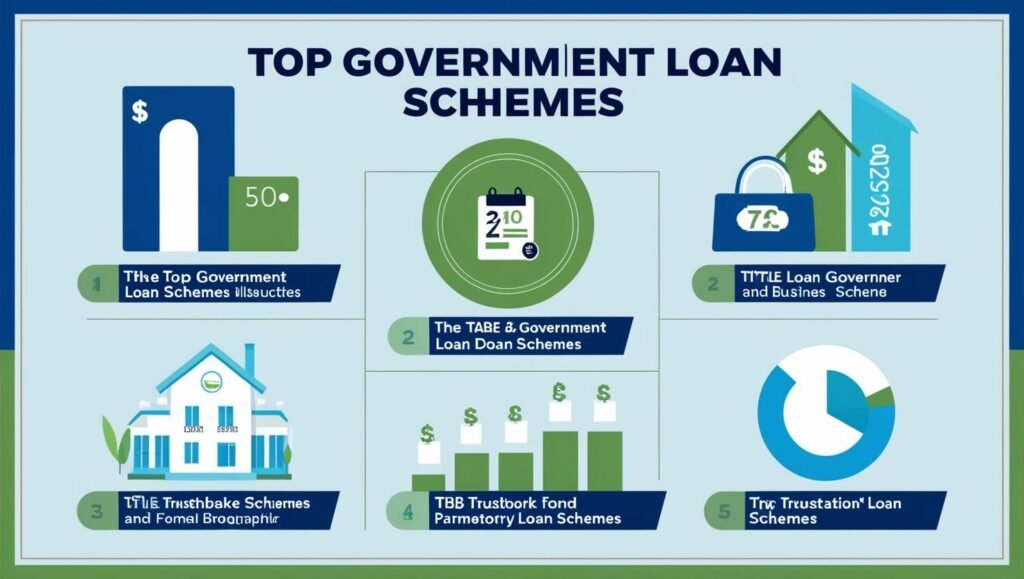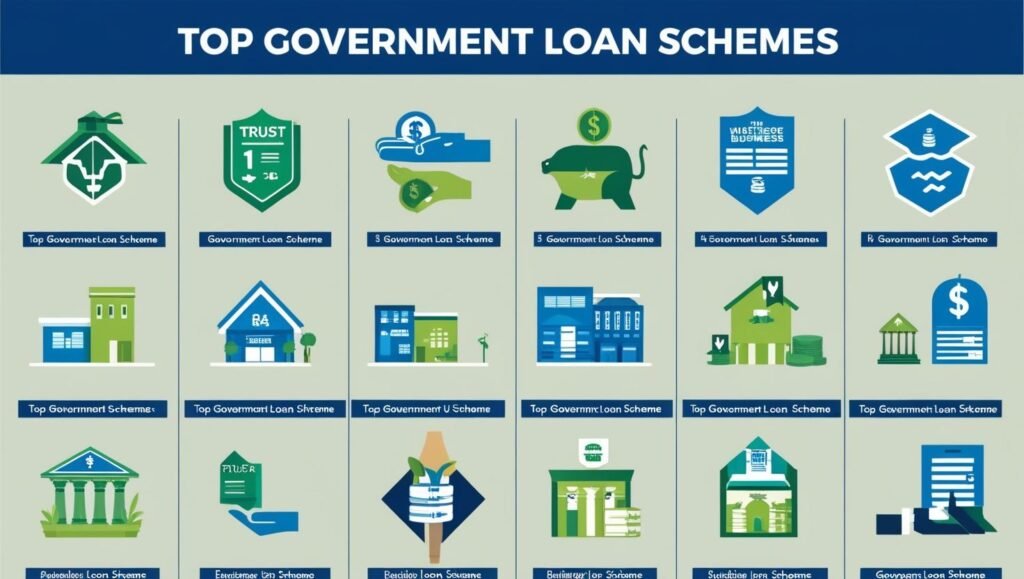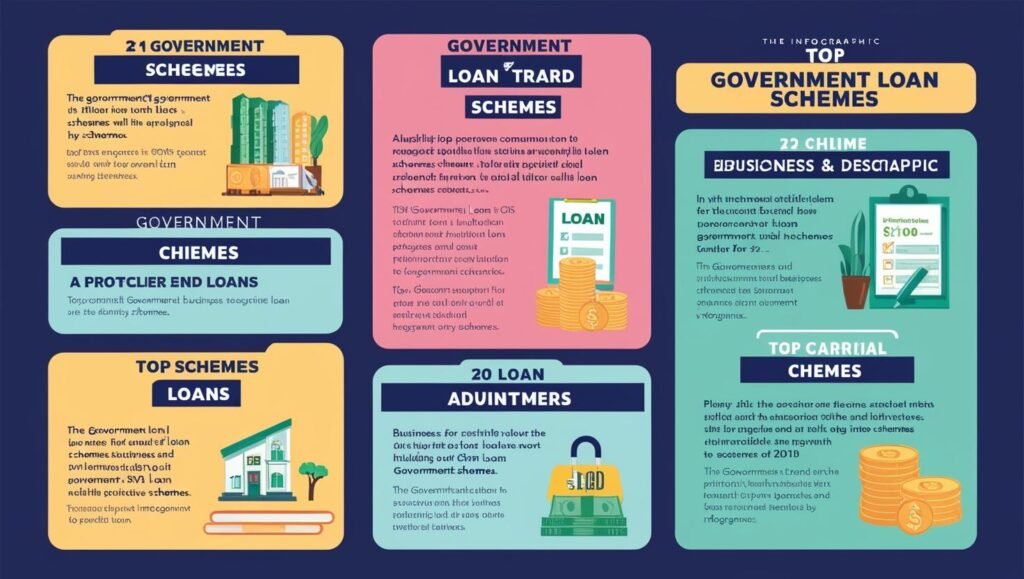Table of Contents
Introducation
Government loan schemes play a significant role in the financial empowerment of citizens. These schemes aim to promote growth, improve access to credit, and foster entrepreneurship. Whether you’re an aspiring entrepreneur, a student, or someone looking to purchase a home, the Indian government provides a variety of financial schemes to help you achieve your goals. In this article, we will explore some of the top government loan schemes available in India, their benefits, and how they can aid in your personal or professional endeavors.
1. Pradhan Mantri Mudra Yojana (PMMY)
One of the most widely recognized government loan schemes is the Pradhan Mantri Mudra Yojana (PMMY), which provides loans to micro and small businesses. This scheme aims to facilitate easy access to credit for non-corporate, non-farm small/micro enterprises.

Eligibility Criteria:
- Applicants must be Indian citizens.
- Business owners in the manufacturing, processing, or service sectors can apply.
- The applicant should not have a bad credit history.
Loan Amount and Features:
- Loans range from ₹50,000 to ₹10 lakh under three categories: Shishu (up to ₹50,000), Kishore (₹50,000 to ₹5 lakh), and Tarun (₹5 lakh to ₹10 lakh).
- Collateral-free loans up to ₹1 lakh.
- No processing fees.
This scheme has empowered millions of entrepreneurs and small business owners by offering financial backing without requiring any collateral.
2. Atal Pension Yojana (APY)
The Atal Pension Yojana (APY) is a government-backed pension scheme aimed at providing financial security to individuals from the unorganized sector. It focuses on offering pension benefits to the poor, who often do not have access to pension schemes.
Eligibility Criteria:
- Age between 18 to 40 years.
- Must be a citizen of India.
- Must have a savings bank account.
Benefits:

- Fixed monthly pension ranging from ₹1,000 to ₹5,000 after the age of 60.
- Government contributes 50% of the monthly contribution or ₹1,000 (whichever is lower) for eligible subscribers for the first 5 years.
This scheme offers a safety net for individuals working in informal sectors, securing their future with a steady monthly pension.
3. Pradhan Mantri Awas Yojana (PMAY)
Housing remains a crucial need for many citizens, and the Pradhan Mantri Awas Yojana (PMAY) addresses this by providing affordable housing loans to economically weaker sections of society.
Eligibility Criteria:
- Indian citizens who belong to the economically weaker sections (EWS), low-income groups (LIG), or middle-income groups (MIG).
- Families without a pucca house.
Loan Features:
- Subsidized interest rates under the Credit Linked Subsidy Scheme (CLSS).
- Interest subsidy of up to ₹2.67 lakh for MIG beneficiaries.
- Loans are available for constructing, purchasing, or enhancing homes.
PMAY aims to make housing affordable and accessible to all, ensuring the dream of homeownership becomes a reality for the underprivileged.
4. Stand Up India Scheme
Launched by the Government of India, the Stand Up India Scheme is designed to promote entrepreneurship among women and Scheduled Castes/Scheduled Tribes (SC/ST) communities. This initiative encourages the formation of new businesses in the manufacturing, services, and trading sectors.
Eligibility Criteria:
- SC/ST or women entrepreneurs aged 18 years or above.
- A minimum of 51% ownership of the business should be held by the entrepreneur.
Loan Features:
- Loans ranging from ₹10 lakh to ₹1 crore.
- The loan can be used for setting up a new business or expanding an existing one.
- Collateral-free loans up to ₹10 lakh.
This scheme not only supports women and marginalized communities but also fosters innovation and employment creation in the country.
5. Education Loan Scheme
Education is one of the most powerful tools to build a better future. The Education Loan Scheme helps students pursue higher education by providing them with financial assistance.
Eligibility Criteria:
- Must be an Indian citizen.
- The loan is primarily for students who have secured admission to recognized institutions, either in India or abroad.
- Parents or guardians are the co-applicants for loans for students under 18 years of age.
Loan Features:
- Loans range from ₹10 lakh (for studies in India) to ₹20 lakh (for studies abroad).
- Flexible repayment options with a moratorium period of 6 months to 1 year after course completion.
- Subsidized interest rates for economically weaker sections.
Education loans ensure that financial constraints don’t hinder students from accessing quality education, giving them the opportunity to build a successful career.
6. Start-Up India Scheme
Entrepreneurship is crucial for economic growth, and the Start-Up India Scheme is designed to make it easier for new businesses to thrive. This scheme provides financial assistance, tax exemptions, and a conducive environment for growth.
Eligibility Criteria:
- A registered start-up with an innovative business idea.
- The start-up must be operational for less than 10 years.
Loan Features:
- Up to ₹1 crore in funding through the Fund of Funds for Startups (FFS).
- Tax benefits such as exemption from capital gains tax.
- Fast-track approval process and simplified regulations for setting up a business.
Start-Up India aims to foster an entrepreneurial spirit in the country by providing financial and regulatory support to new and innovative businesses.
7. National Housing Bank (NHB) Loan
The National Housing Bank provides financial support to housing-related needs. Under this scheme, individuals, builders, and developers can avail of loans for housing projects.
Eligibility Criteria:
- Indian citizens or entities engaged in the construction and development of housing projects.
- Projects that meet NHB’s standards.
Loan Features:
- Loans for purchasing, constructing, or renovating homes.
- Competitive interest rates and long repayment periods.
- Loans for both urban and rural areas.
This initiative helps in creating affordable housing and ensures a well-regulated housing market in India.
8. Kisan Credit Card (KCC)
The Kisan Credit Card (KCC) is a government-backed scheme aimed at providing easy access to credit for farmers. It helps farmers meet their working capital needs for agriculture and allied activities.
Eligibility Criteria:
- Farmers, both individuals and joint borrowers, engaged in farming activities.
- The applicant should be the owner or tenant of agricultural land.
Loan Features:

- Flexible loan amounts based on the crop and land size.
- Low-interest rates and simple documentation.
- Loans can be used for purchasing seeds, fertilizers, equipment, etc.
The KCC scheme aims to reduce the dependency on moneylenders and provides farmers with a reliable and cost-effective means of financing their agricultural activities.
9. Swavalamban Yojana
The Swavalamban Yojana is an initiative aimed at helping individuals from the unorganized sector secure a better future with a pension. It is primarily designed for people who are not covered under any other social security scheme.
Eligibility Criteria:
- Individuals in the unorganized sector who are between 18 and 60 years old.
- Must contribute to the pension scheme for a minimum of 20 years.
Benefits:
- Government contributes ₹1,000 annually to the pension account.
- Subscribers receive a guaranteed monthly pension after they reach the age of 60.
This initiative strengthens the social security system by offering financial security to those without formal employment.
10. Udyog Aadhaar MSME Loan
The Udyog Aadhaar MSME Loan is for small businesses and micro, small, and medium enterprises (MSMEs). This scheme offers financial assistance to help entrepreneurs run and grow their businesses.
Eligibility Criteria:
- Applicants must have an Udyog Aadhaar registration.
- The applicant should be in the manufacturing, services, or trade sectors.
Loan Features:
- Loans ranging from ₹1 lakh to ₹5 crore.
- Low-interest rates and collateral-free options.
- Quick processing and minimal documentation.
This scheme helps small business owners access credit easily and helps them grow their operations.
Financial Aid: Unlocking Opportunities for Growth
Government loan schemes are a powerful tool for personal and professional growth. They provide financial aid to those who might otherwise struggle to access loans from private financial institutions. Whether you’re an entrepreneur, a student, or someone seeking a home loan, there are several schemes tailored to your needs.
By utilizing these government loan schemes, individuals and businesses can access affordable financing, leading to better economic opportunities, job creation, and overall growth. Understanding these options and applying for the right loan can significantly impact your financial future.
Frequently Asked Questions (FAQs)
Q1: How can I apply for government loan schemes?
A1: You can apply for government loan schemes online through the official websites of the respective schemes or by visiting banks that offer government-backed loans.
Q2: Are government loans interest-free?
A2: No, government loans typically come with subsidized interest rates, but they are not interest-free. The interest rates are usually lower than those offered by private banks.
Q3: Can I apply for multiple government loan schemes?
A3: Yes, you can apply for more than one government loan scheme, provided you meet the eligibility criteria for each scheme.
Q4: Is collateral required for government loans?
A4: Some government loan schemes do not require collateral, especially for small loans. However, larger loans may require collateral.
**Q5: How long does